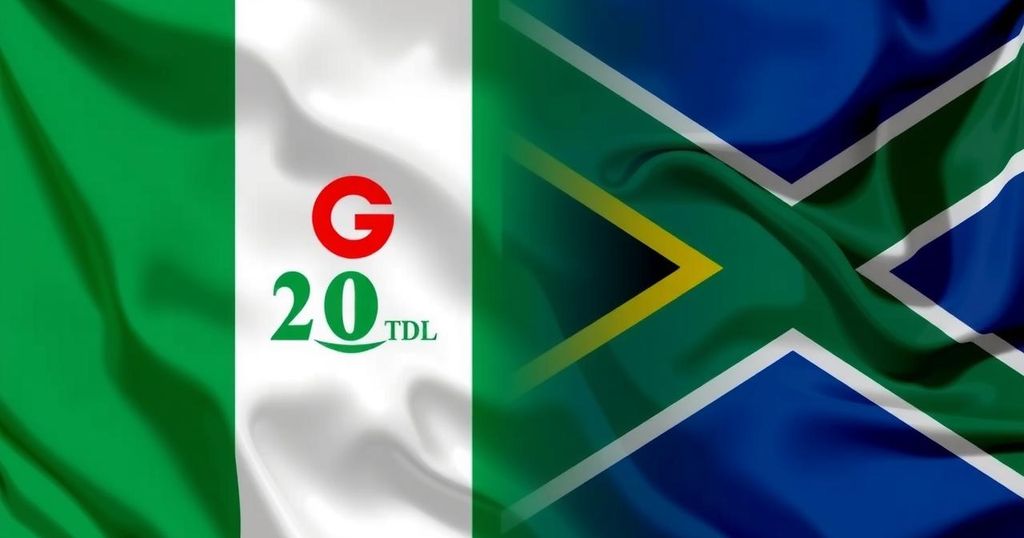South Africa Pledges Support for Nigeria’s G20 Membership Bid
South Africa’s President Cyril Ramaphosa announced the country’s support for Nigeria’s bid to join the G20 during the launch of South Africa’s G20 presidency in Cape Town. Ramaphosa emphasized the importance of raising Africa’s voice in global affairs and mirrored this support to the backing given to the African Union. The G20 presidency comes amidst significant global challenges, including climate change and debt sustainability for low-income nations, which South Africa aims to address during its tenure.
President Cyril Ramaphosa of South Africa announced on Tuesday that the nation will extend its support to Nigeria in its pursuit of membership in the G20. This declaration was made during the ceremonial commencement of South Africa’s presidency of the G20 in Cape Town, marking a significant development, as this is the first instance where an African nation leads this influential group of economies on an annual rotational basis.
President Ramaphosa articulated, “Nigeria will be keenly supported by us. We have been a lone member of the G20. We shall need to raise the voice of Africa which had been neglected.” He emphasized that South Africa will provide backing similar to that which it offered to the African Union, which became a recognized member of the G20 at the summit held in New Delhi last year.
On the preceding Monday, during a session of the eleventh bi-national commission between South Africa and Nigeria, Nigeria’s Minister of State for Foreign Affairs, Bianca Odumegwu-Ojukwu, expressed Nigeria’s intention to join the G20 and specifically sought South Africa’s endorsement. Following this development, South Africa officially began its tenure as G20 president on Sunday.
In his speech, President Ramaphosa underlined that this presidency comes at a critical juncture when the global community is grappling with various challenges, including the intensified crisis related to climate change, an escalation in conflicts, and geopolitical instability. He noted that these issues are exacerbating hardships across numerous regions. The president further indicated that this transformative period, characterized by technological advancements, presents both opportunities and threats.
With respect to objectives outlined during his presidency, Ramaphosa articulated a commitment to enhancing disaster resilience in the face of climate-induced calamities that disproportionately affect vulnerable countries. He called upon the global community, along with international financial institutions and the private sector, to heighten post-disaster reconstruction efforts. Furthermore, he pledged to prioritize debt sustainability for low-income nations and to facilitate funding for a just energy transition.
Overall, President Ramaphosa’s address encapsulated the vision for South Africa’s G20 tenure as one that seeks collaboration to address pressing global issues, highlighting the ambition of raising Africa’s voice in international deliberations.
This article discusses the announcement made by South African President Cyril Ramaphosa regarding the support for Nigeria’s bid to join the G20. It highlights the significance of this event in the context of international relations, especially concerning African representation in global decision-making forums. The article provides insight into the ongoing G20 presidency of South Africa and its focus on global challenges such as climate change and economic sustainability for low-income nations, underscoring Africa’s perspective and role in these discussions. The G20 is an essential group that assembles the world’s major economies to address significant global issues.
In conclusion, President Ramaphosa’s commitment to supporting Nigeria’s G20 membership bid marks a pivotal step in elevating Africa’s presence in international economic discussions. His response to existing global challenges reflects South Africa’s strategic objectives during its G20 presidency, centered on disaster resilience, debt sustainability, and energy transitions. The outcome of this collaborative effort could significantly shape the future engagement of African states within global economic governance. As South Africa leads the G20, the support extended to Nigeria signifies a crucial moment for African nations to unify their voices in addressing pressing global concerns.
Original Source: www.aa.com.tr




Post Comment